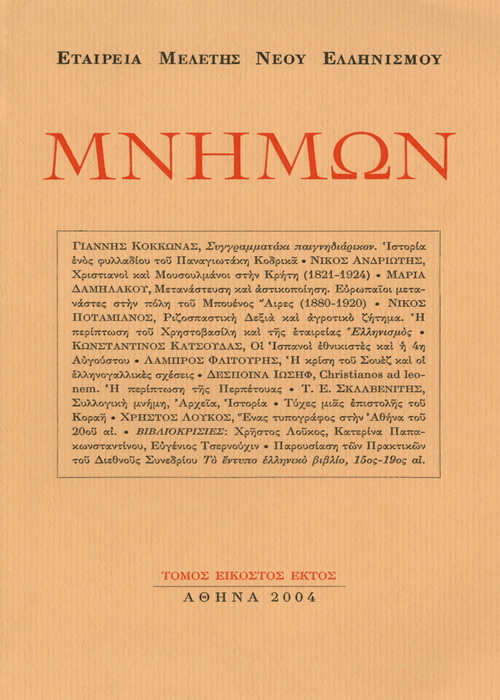ΜΙΑ ΔΙΚΤΑΤΟΡΙΑ ΠΟΥ ΔΕΝ ΕΙΝΑΙ ΔΙΚΤΑΤΟΡΙΑ. ΟΙ ΙΣΠΑΝΟΙ ΕΘΝΙΚΙΣΤΕΣ ΚΑΙ Η 4η ΑΥΓΟΥΣΤΟΥ
Περίληψη
Konstantinos Katsoudas, "A Dictatorship that is not a Dictatorship". Spanish Nationalists and the 4th of August
The Spanish Civil War convulsed the international public opinion and prompted most foreign governments to take measures or even intervene in the conflict. Greek entanglement either in the form of smuggling war materiel or the participation of Greek volunteers in the International Brigades has already been investigated. However, little is known about a second dimension of this internationalization of the war: the peculiar forms that the antagonism between the two belligerent camps in foreign countries took. This paper, based mainly on Spanish archival sources, discusses some aspects of the activity developed in Greece by Franco's nationalists and the way Francoist diplomats and emissaries perceived the nature of an apparently similar regime, such as the dictatorship led by general Metaxas. The main objectives of the Francoist foreign policy were to avoid any escalation of the Spanish civil war into a world conflict, to secure international assistance for the right-wing forces and to undermine the legitimacy of the legal Republican government. In Greece, an informal diplomatic civil war broke out since Francoists occupied the Spanish Legation in Athens and Republicans took over the Consulate in Thessaloniki. The Francoists combined public and undercover activity: they worked hard to achieve an official recognition of their Estado Nuevo, while at the same time created rings of espionage and channels of anticommunist propaganda. The reason of their partial breakthroughs was that, contrary to their Republican enemies, the Nationalists enjoyed support by a significant part of the Greek political world, which was ideologically identified with their struggle. Francoist anti-communism had some interesting implications for Greek politics. An important issue was the Francoist effort to reveal a supposed Moscow-based conspiracy against Spain and Greece, both considered as hotbeds of revolution in the Mediterranean, in order to justify both Franco's extermination campaign and Metaxas' coup. Although this effort was based on fraudulent documents, forged by an anti-Bolshevik international organization, it became the cornerstone of Francoist and Metaxist propaganda. General Metaxas was the only European dictator to invoke the Spanish Civil War as a raison d'etre of his regime and often warned against the repetition of Spanish-like drama on Greek soil. Nevertheless he did not approve of Franco's methods and preferred Dr. Salazar's Portugal as an institutional model closer to his vision. For Spanish nationalist observers this was a sign of weakness. They interpreted events in Greece through the disfiguring mirror of their own historic experience: thus, although they never called in question Metaxas' authoritarian motives, the 4th of August regime was considered too mild and soft compared to Francoism (whose combativeness and fanaticism, as they suggested, the Greek General should have imitated); it reminded them the dictatorship founded in Spain by General Primo de Rivera in 1920s, whose inadequacy paved the way for the advent of the Republic and the emergence of sociopolitical radicalism. Incidents of the following years, as Greece moved towards a civil confrontation, seemed to strengthen their views.
Λεπτομέρειες άρθρου
- Πώς να δημιουργήσετε Αναφορές
-
ΚΑΤΣΟΥΔΑΣ Κ. (2004). ΜΙΑ ΔΙΚΤΑΤΟΡΙΑ ΠΟΥ ΔΕΝ ΕΙΝΑΙ ΔΙΚΤΑΤΟΡΙΑ. ΟΙ ΙΣΠΑΝΟΙ ΕΘΝΙΚΙΣΤΕΣ ΚΑΙ Η 4η ΑΥΓΟΥΣΤΟΥ. Μνήμων, 26, 157–181. https://doi.org/10.12681/mnimon.837
- Τεύχος
- Τόμ. 26 (2004)
- Ενότητα
- ΜΕΛΕΤΕΣ
Οι συγγραφείς των άρθρων που δημοσιεύονται στο Μνήμονα διατηρούν τα δικαιώματα πνευματικής ιδιοκτησίας επί των άρθρων τους, δίνοντας στο περιοδικό το δικαίωμα της πρώτης δημοσίευσης. Άρθρα που δημοσιεύονται στο Μνήμονα μπορούν να χρησιμοποιούνται ελεύθερα, χωρίς δικαίωμα τροποποίησης (δημιουργία παράγωγου έργου) με αναφορά στο συγγραφέα και στην πρώτη δημοσίευση για μη κερδοσκοπικούς σκοπούς(άδεια Creative Commons 4.0). To Εθνικό Ίδρυμα Ερευνών διατηρεί το δικαίωμα να δημοσιεύει, να αναπαραγάγει, να παρουσιάζει στο κοινό, να διανέμει και χρησιμοποιεί άρθρα που δημοσιεύονται στο Μνήμονα σε οποιοδήποτε μέσο και μορφή είτε μεμονωμένα είτε ως μέρη συλλογικών έργων, για όλο το χρόνο διάρκειας προστασίας της πνευματικής ιδιοκτησίας και για όλες τις χώρες του κόσμου. Αυτό περιλαμβάνει ενδεικτικά και όχι αποκλειστικά, το δικαίωμα δημοσίευσης των άρθρων σε τεύχη του περιοδικού Μνήμων, αναπαραγωγής και διανομής μεμονωμένων αντιγράφων των άρθρων, αναπαραγωγής ολόκληρων των άρθρων σε άλλη έκδοση του ΕΙΕ, και αναπαραγωγής και διανομής των άρθρων ή περίληψης αυτών με χρήση πληροφορικού συστήματος αποθετηρίου.



